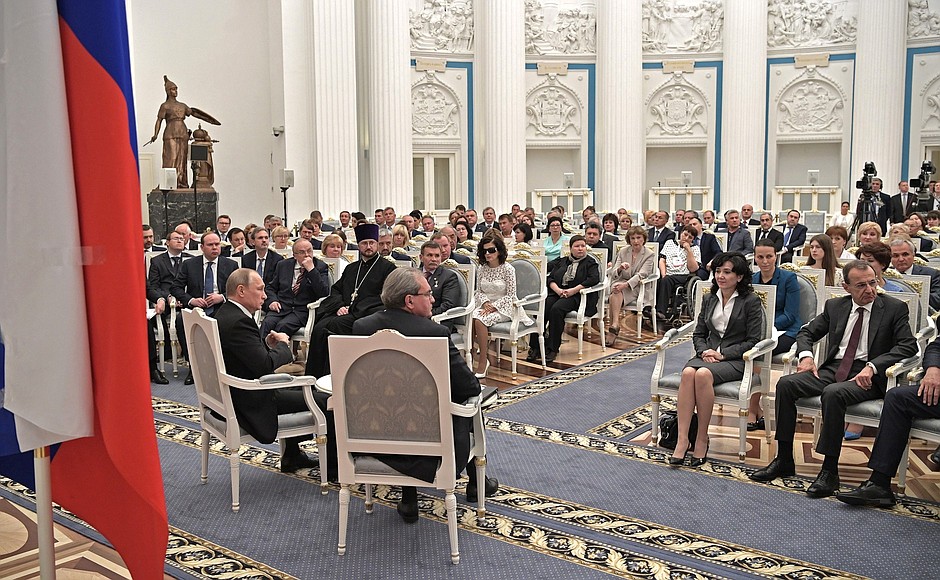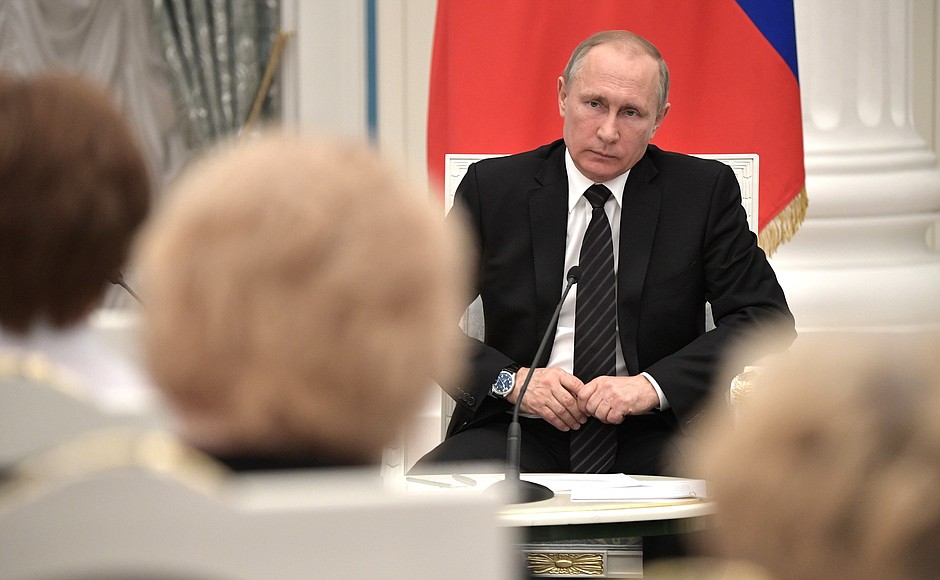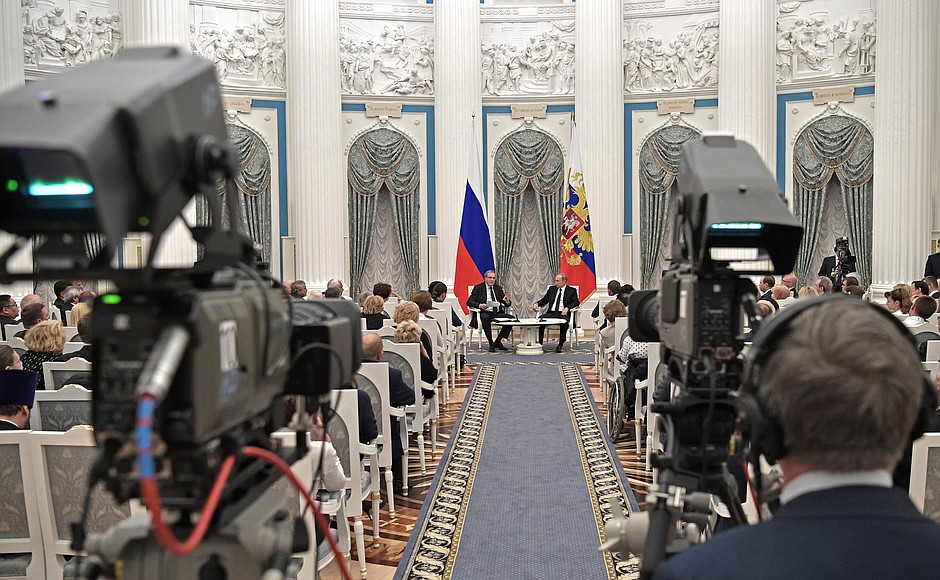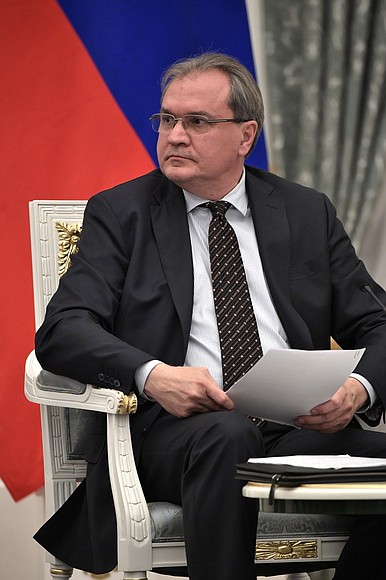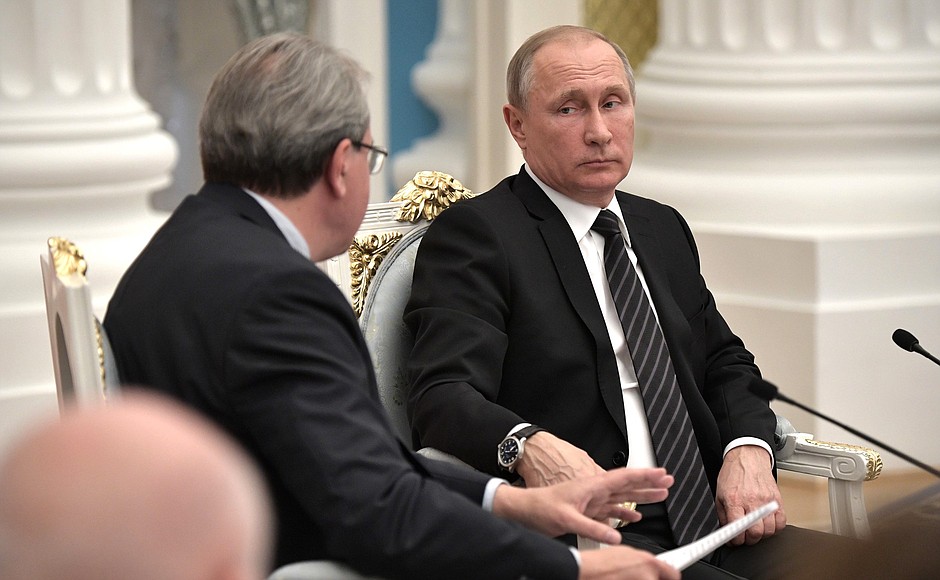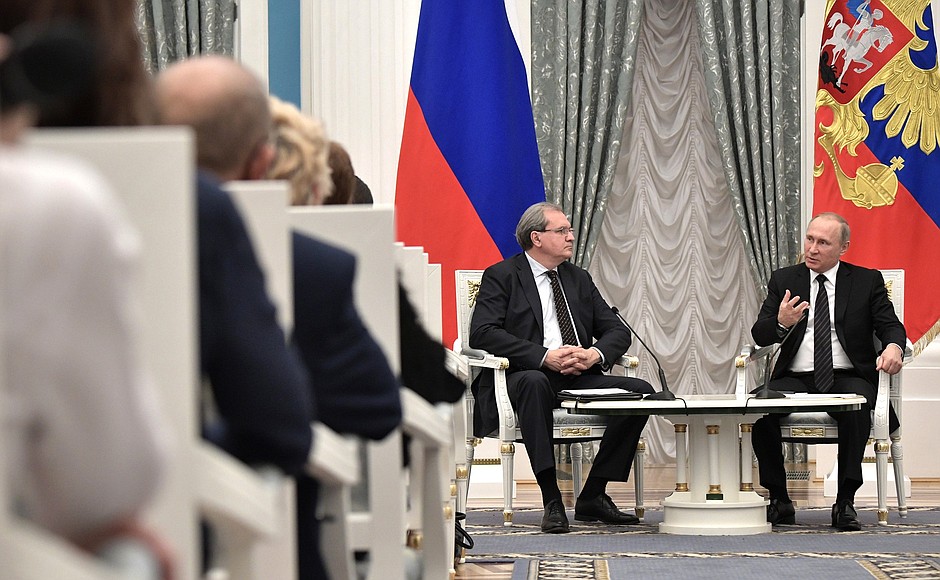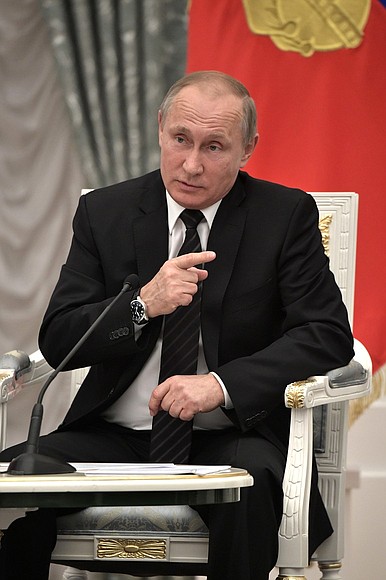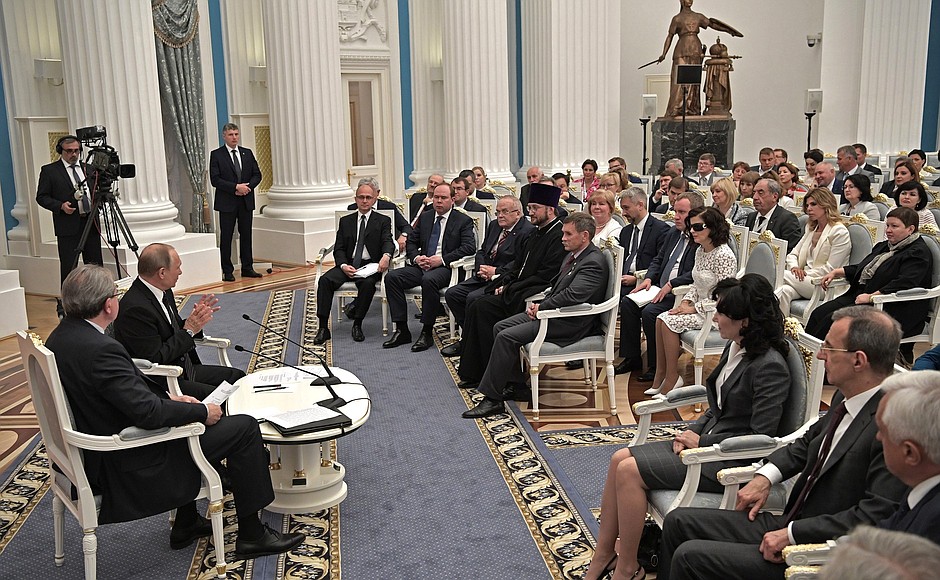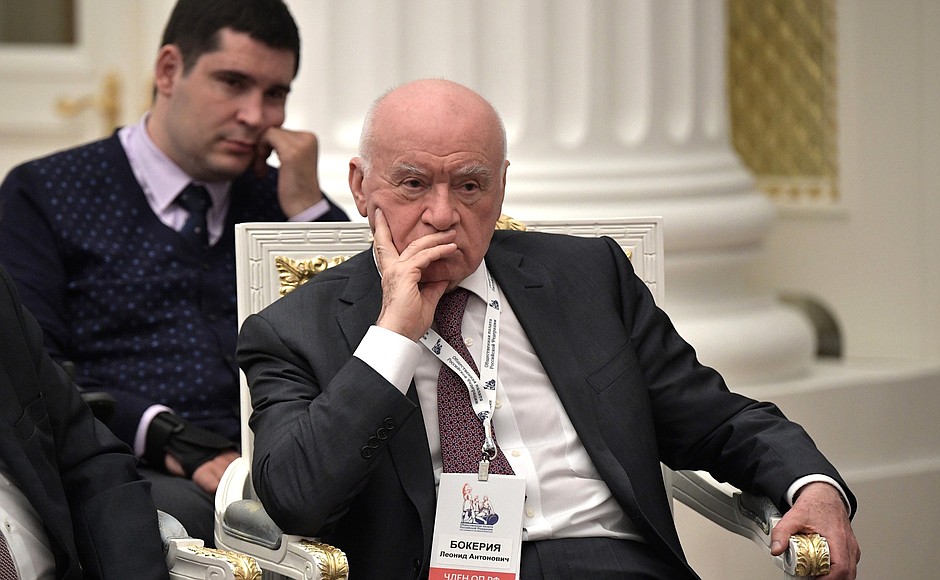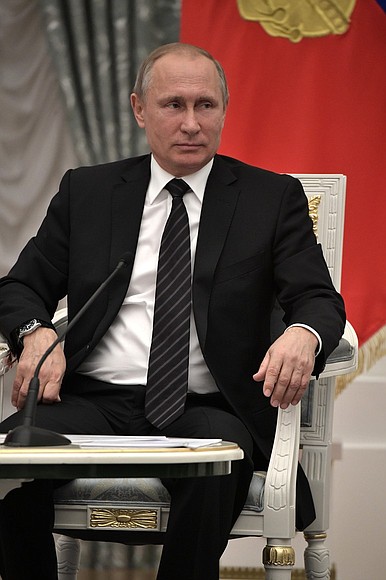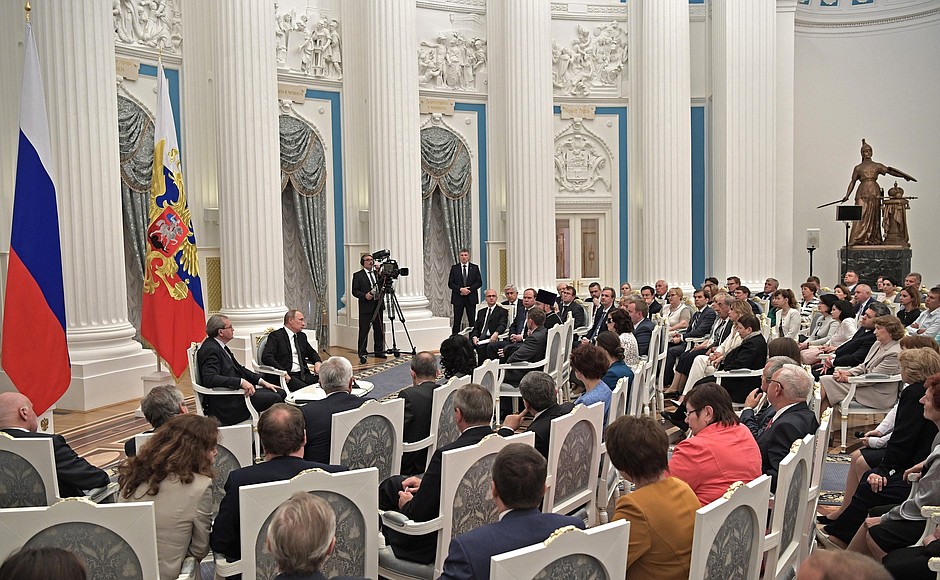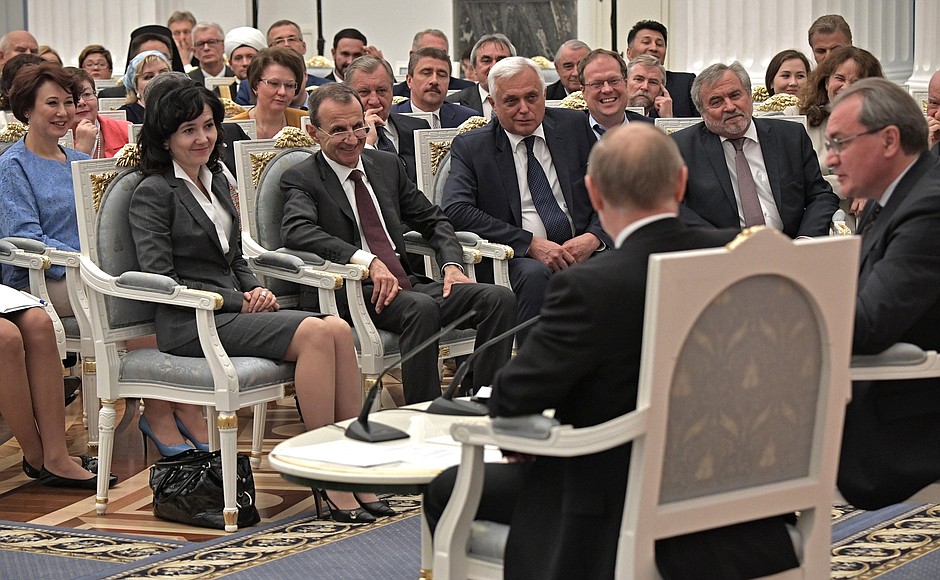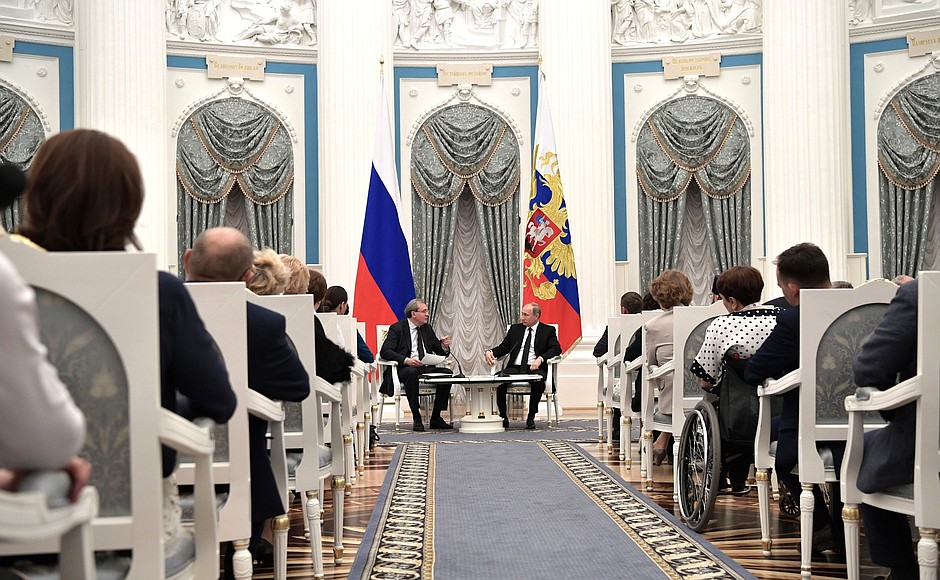The Civic Chamber’s new membership was established in a three-stage process. Forty members were approved by the Presidential Executive Order of March 20, 84 were delegated by regional civic chambers, and 43 were selected in a vote from among 403 candidates put forward by non-commercial organisations.
The Civic Chamber held a plenary session on June 19, at which it elected Valery Fadeyev as its new secretary. The current Civic Chamber will serve until 2020.
* * *
President of Russia Vladimir Putin: Good afternoon, colleagues,
The 6th Civic Chamber has been formed. I congratulate you on this achievement, and wish you every success in your work.
You and I are aware of how the Civic Chamber’s activities are regarded. However, I am absolutely convinced that for all the criticism, which I am aware of, the Civic Chamber is not a failed organisation, and it has things to do.
What are these ”things“? It should not replace the Government or the parliament. It should have a niche of its own, which it has. It includes public oversight over executive and representative bodies of authority, expert analysis of immediate and more distant plans, assessing how these plans are implemented, and directly communicating with the people who are on the receiving end of the authorities’ efforts to improve life in our country.
There is another, seemingly utilitarian task, which is nonetheless important, I believe. It is about forming civic councils at the ministries and departments. I would very much like this work – as it sometimes happens, it cannot be denied – not to turn into a perfunctory Brownian movement, which no one needs. On the contrary, it should be a meaningful effort aimed at improving the quality of the ministries and departments’ activities. If we put this all together, what we will get is a fairly extensive scope of work that our society needs.
I have no doubts about the individuals who will do this work. Here you have Heroes of Russia, veterans, researchers, and coaches who train our Olympic champions. Here you have people who could, if necessary, head any ministry or department, work in representative bodies of authority, both federal and local. By the way, work in the regions and municipalities is also one of the critical elements of this kind of activity.
I will conclude my monologue now and give the floor to Mr Fadeyev, after which we will discuss the issues that concern us.
Please Mr Fadeyev, go ahead.
Civic Chamber Secretary Valery Fadeyev: Thank you, Mr President.
Yesterday we held the first plenary meeting and began to discuss major areas of work without delay. Many speeches were made, and now I will mention literally just a few principles and areas of work and later on my colleagues will continue talking about them.
You said the Civic Chamber is carrying out expert studies on a large scale and that “zero readings” as an institution is working well. This is a very important aspect. But in this context we are following along. You said it is necessary to have direct communication with the public. I think in this respect, as we discussed with our colleagues yesterday, we must influence the agenda.
You said on Russia Day a week ago that the focus of everyone must be on a positive, creative agenda. The grassroots agenda pinpoints the problems that are worrying people above all: income, housing and utilities, the distribution of incomes, the uneven distribution of incomes among the regions and the like. We all know about these problems and, of course, the Government and legislative bodies are resolving some of them. Importantly, these problems should be discussed in understandable terms, without being simplified. I think in this respect our chamber’s communication with the public is very important.
It is vital to rely on the land, on the regions because there is a network of regional chambers and it is working well, and local chambers have already been established. However, regional chambers are excessively dependent on local government. This is only natural because local bosses want to control everything that is happening in their regions, including the non-profit sector. As we discussed yesterday, it is necessary to propose a programme on strengthening regional civic chambers and giving them more autonomy in their actions. This could be included in the process of their formation. We discussed ways of consolidating the regional media in conjunction with civic chambers because communication is a vital aspect.
Funding is a mundane thing. Little money is needed to fund regional offices of civic chambers. Some offices are being funded. The irony is that, you would think that the one who gives the money is supposed to call the shots, but no, this is not the case. In the regions where the authorities have established effective interaction with the civic chambers, these chambers are being properly funded, because local authorities respect civic chambers, which leads to effective cooperation.
We discussed this important regional issue yesterday. I think that issues should be raised from the bottom up, and the most important regional issues should be discussed here in Moscow. Half of the Civic Chamber members represent regions. The agenda should be formed from the bottom up.
There is another important project, which is already taking off. In your Address of December 2016, you directly addressed the Civic Chamber, calling on it to step up its work with civil society. The project was named ”Implementing best practices in the sphere of public life.“ The name is bureaucratic, but the underlying meaning of it is not. Officials often avoid interacting with non-commercial organisations and activists. These people are often hard to deal with, ”prickly,“ with complex characters, and, of course, officials often find it convenient just to move them aside a little.
To reiterate, regions where such interaction is active are often successful. All successful regions demonstrate consolidation around the goals and involvement of civic activists in the development of the regions. It is important to teach officials, perhaps, even to push them to do this work, and to explain to them that they will benefit in terms of successful development of their respective regions.
On the other hand, not all activists can do their job properly. True, there is a cohort of professionals who excel at obtaining grants. But there are other activists who are not good at getting grants, but they try to work effectively. They should also be taught how to interact with the authorities.
Vladimir Putin: To teach those who are not good at getting grants how to do so.
Valery Fadeyev: So that those who do good work could also get grants.
This is about joint work with the authorities. We need this, and we need to work together. We started a pilot effort in Veliky Novgorod, Ryazan, and Yaroslavl, and will now proceed to expand our coverage. This is not about some activities of a general nature in Moscow. It is about actual work in a specific city with specific local officials and activists, not just official non-commercial organisations. Importantly, many activists, especially young people and volunteers, operate outside of any organisation. However, there are already millions of volunteers, especially among students. So, one of our goals is to establish interaction with the universities and other educational institutions. This work is already underway. Universities are a source of youthful student energy.
You mentioned public oversight. The law on public oversight was adopted at the initiative of the Civic Chamber. There are some issues with this law. It is very well written, but lacks efficiency when it comes to implementation. We are now drafting proposals to fil the gaps regarding implementing regulations.
As for public councils with federal and regional executive bodies, the previous membership of the Civic Chamber secured the right for the Civic Chamber to staff these public councils, which is a powerful asset for us. I remember a recent discussion on healthcare at a State Council meeting, when the Healthcare Minister said we would rely on public councils when it comes to implementation oversight. There was some irony in your reaction. We understand these signals and will try to move in this direction.
Public diplomacy is another important element. The international situation is clear. If we take the West, there is a divide between politicians on the one hand, and business and the public, on the other hand. What do we see? Foreign businesspeople came in large numbers to the recent St Petersburg International Economic Forum. Russia’s relations with the US are somewhat of a paradox, since despite political tension, trade increased last year, even though it remains modest. Businesses are eager to work with Russia. It is clear that the same goes for civil society. In this area, the Civic Chamber could make a substantial contribution to promoting ties on the civil-society level, which in turn could put some pressure on the politicians.
My last remark is about the annual report on the state of civil society in the country, which the Civic Chamber has a legal obligation to prepare. We decided that we needed to release this report earlier than we used to, before the Address to the Federal Assembly. For example, if the report was released in November, you could use it to assess the state of civil society in Russia.
This is what I wanted to say in regards to the Civic Chamber.
Shall we move on, Mr President?
Vladimir Putin: Yes, of course.
Valery Fadeyev: Father Alexander Tkachenko, please.
Archpriest Alexander Tkachenko: The children’s hospice began with the dream of a girl who wanted to get well. Unfortunately, her disease proved to be more powerful than the doctors’ efforts, but she told us what she wanted to do for the other children who were receiving treatment with her, what could be done to mitigate the fear, pain and loneliness. She confided in me, probably because she believed that the Church could change much in her life, in the life of society and in the lives of other children. This is how a new area of medicine appeared.
There are many more examples of such social work in this country. This is why people from many countries come here. This year the children’s hospice welcomed people from Ukraine, Kazakhstan, Estonia, Latvia and the United States. We are expecting to receive delegations from Belgium and Italy. Russian experience in dealing with social problems is interesting not only in the field of medicine and palliative care.
This obvious progress in creating social care technologies can and should be presented internationally. This is one of the Civic Chamber’s priorities and our responsibility. Russian experience in the area of social assistance can first of all help our colleagues from the former Soviet republics and the CIS, because their social conditions and the social care systems are similar to those in Russia. This will certainly improve the country’s image and help rally compatriots in a common social space.
In other words, we must not be embarrassed by our achievements and our success, which are of interest in the world. We will present our programmes for exchanging experience and hope to receive support for them from Rossotrudnichestvo [the Federal Agency for CIS Affairs, Compatriots Abroad and International Humanitarian Cooperation], the Healthcare Ministry and the Ministry of Labour and Social Protection.
Thank you.
Vladimir Putin: I would like to make a brief comment.
If you want this work to be effective, do not work directly with any official agencies abroad. They have other goals with regard to Russia and everything related to Russia. Work directly with your peers, who will then duly, and I hope positively, influence the cooperation process, as well as Russia’s image that you have mentioned and that we also greatly value, of course.
The thing is that all official agencies are not independent; they are in a well-known political paradigm and it is very difficult for them – even if certain persons wanted to do so – to take a step to the left or to the right or jump up or down. It is simply important to work directly with people, through what is known as people-to-people diplomacy and it will lead to success.
In fact, it is also needed by the people you work for and the honest people who come to you from the countries you have mentioned and those who are willing to come from other countries. You should work with them directly.
Alexander Tkachenko: That is very good advice. Thank you.
Vladimir Putin: Whatever you do, do not go to any ministries or government agencies. I assure you that bureaucracy there is even worse than here and the state there is much tougher than here. Administrative agencies are made of reinforced concrete; they cut no slack.
I said recently in an interview with an American journalist, where is Occupy Wall Street? The FBI tore everything to shreds; no one is left there. But they did it so quietly as though they dissolved [them] in acid. Hey presto – and everything disappeared. Those guys are real professionals We have turbulence here, but they do not: you cannot play any games there. You see, turbulence can occur only where it is allowed there. We do not even notice that. They have a well-built system but we do not. Here, everything is more liberal and somewhat easier. So, in your work, deal directly with your colleagues. I assure you, they are just as honest and sincere as you are and they really want [to help]. Their goal is to help the people, especially in your field. And this will be effective.
Thank you very much.
Alexander Tkachenko: Thank you.
Valery Fadeyev: Thank you.
Mr Vinnitsky represents the Civic Chamber in Sverdlovsk Region. Please.
Vladimir Vinnitsky: Good afternoon, Mr President.
You know that people in the Urals are laconic, tough and not inclined to political protest. That is why we have taken the law on the Civic Chamber so seriously, all the more so since it was mostly drafted within the Civic Chamber and was widely debated, including by my fellow countrymen in the Urals.
This is why we are trying to implement it in full. As far as I know, there is no other such law in the world and it really makes it possible to attract many concerned people, who are, importantly, competent and not indifferent. To do this, we have formed a 250-person Expert Council and we will also recruit people from NGOs that can contribute about 300 participants. If we multiply this by 86, there would be about 25,000 for the country as a whole, this is not counting municipalities or other forms of public supervision. It is an entire army. It enables real involvement in these activities
Regrettably, however, as often happens, certain quite important and serious matters were overlooked as this law was being drafted. Specifically, an instruction – if we can call it that – to amend the regulations that were to accompany the coming into force of this law has not been carried out. As a result, many procedures cannot be put into practice, in particular the most important one that makes it possible to bring an action in defence of any number of unspecified persons. This is a real process indeed, which, first, comes directly from the Chamber and requires no intermediaries, because otherwise, we have to apply to law enforcement, authorised officials or other bureaucrats, and of course, this procedure occasionally fails to produce the desired effect.
Therefore I have a strong request to make – we discussed this with my colleagues yesterday and they supported me – please issue instructions to amend properly the list attached to Law No. 212, while Article 10 of the law, which allows actions of this kind, would rule out the reference that prevents the chambers from filing lawsuits directly, because this is now possible only in cases stipulated by federal law. As a result, we have a vacuum. I would like to ask you to help us with this matter.
Thank you.
Vladimir Putin: Let us come back to this issue later on. However, I am sure you know, because you have addressed this issue, that lawyers have certain apprehensions in connection with this possible procedure for suing an unspecified group of persons. I will not go into detail now because you are sure to know this. But let us get back to this once again and let us see how we can eliminate lawyers’ concerns and, at the same time, resolve this issue in such a way as to allow the Civic Chamber to exercise its powers more effectively.
Speaking of the political events you mentioned, I do not think we should fear this because such events differ from one another. If these events are mere publicity stunts, if they amount to self-advertising, and if they mostly try to capitalise on various issues, and everyone has problems everywhere (Russia possibly faces more problems in some areas and perhaps fewer problems in other areas than other countries do), then this obviously amounts to capitalising on issues, to self-advertising, and this is probably not the best way and not the best kind of political activity.
On the other hand, if this political activity is a real attempt to improve the situation and to really expose some matters, then we should not fear this. This is a big country. I believe we should not fear this. It is impossible to see all developments from these offices, and we should not be apprehensive when people see local issues and mention them. I believe we should not fear this.
However, everything should always be in line with the law. This is the most important thing. Instead of staging provocations, one should strive to achieve changes for the better. This is a fine line, of course, but еру people here understand and feel this line, all the more so as you have noted that you are supported by the people. Well, of course, you do not just have 168 people at your disposal. Every member of the Civic Chamber is a person who has achieved and accomplished something. In effect, you are backed by numerous like-minded people, the people you have taught and your co-workers at еру various agencies where you work. This already amounts to thousands of people. Therefore, you must rely on all those people who trust you, while addressing purely political issues, and I do not see anything terrible here.
Valery Fadeyev: Thank you.
Ms Amelchenkova, Chair of the Volunteers of Victory National Civic Movement, please.
Olga Amelchenkova: Good afternoon, Mr President, Mr Fadeyev, colleagues.
In the Civic Chamber, I represent the country’s largest, 170,000-strong volunteer team, which works to preserve the memory of the events and heroes of the Great Patriotic War. We perform maintenance on memorial sites and help veterans, and not only on May 9. This year, over 160,000 volunteers took part in organising the main events dedicated to Victory Day, including the Victory Parade and the Immortal Regiment march.
I would like to say that regional executive bodies really helped us. Fifty-four regions included volunteers on organising committees for Victory Day celebrations; eleven regions did not, but we worked well with them anyway. Unfortunately, we had problems with other regions and some regions simply turned down our offer to help.
Volunteers take their job very seriously. Here is an example. Mr President, you may remember May 9, Moscow, Red Square and what the weather was like. Despite overnight freezing temperatures, our volunteers laid gifts on the stands; despite the cold and the wind, 2,500 volunteers came to help in Moscow and were happy to make their contribution to the celebration, to organising it. In this context, I would like to ask you for assistance to ensure that federal and regional executive bodies use volunteers in organising main events, and not only those related to Victory Day but other events as well, because that will give the younger generation a sense of involvement in the historical events in our country’s life.
Another matter I would like to raise concerns the study of our history. Opinion surveys show that our school and university students have poor knowledge of our country’s history. In our opinion, introducing a graduation exam in history would not be effective without providing additional interactive formats that would encourage young people’s interest in history.
We have formulated a number of ideas and brought together young people, the professional historical community and psychologists who have helped us create and implement a really interesting interactive format for studying history, which can be used in addition to classes and lectures. One example is national history quests based on veterans’ recollections of the main events of the Great Patriotic War.
Funding is a crucial issue. These quests are not expensive. For example, a quest we have organised in Moscow for 120 people cost only 300 rubles. This format can be used on a large scale throughout the country. Last year, 85 Russian regions joined these quests, which attracted over 150,000 participants. For our part, we are ready to use the opportunities of the Civic Chamber and also attract other NGOs in this sphere and as well as the Education Ministry to create a modern interactive and, more importantly, interesting format for studying history and add it to the standard curriculum.
I would like to say in conclusion that the Civic Chamber has young representatives from youth NGOs who can rally thousands of volunteers, including young people from rural areas, rescue workers and members of student’s teams. We are grateful to you for giving assistance to us at the top state level. For our part, we promise to do our best not to fail your trust in us and to contribute to the country’s development.
Vladimir Putin: Thank you.
As for the importance of the volunteer movement, I spoke about this more than once and so will not dwell on it at length now. Thousands and possibly tens of thousands of people around the country are involved in this movement, which has grown in scale and is contributing to the government’s efforts in highly important and complex areas.
All of this began not so long ago even though it has a long history and deep roots, but actually, it began with the work on the Olympic Games. We opened schools and volunteer training courses at universities and colleges. As you know, we even passed legislation to allow NGOs to get involved in socially important projects. I sincerely believe that NGOs are sometimes more effective in these areas and more responsive to people than purely bureaucratic agencies are.
The only thing we have not agreed on yet is direct financing for this movement. I believe that the moment we begin, the volunteer movement will turn into just another bureaucratic organisation with internal squabbling over the distribution of resources or something else. It seems to me that at this point we should refrain from that, even though administrative support at the local, regional and national level will certainly continue.
I have repeatedly spoken about this. You have asked for an additional signal to be sent to our colleagues at municipalities and regions. Our meeting today and our conversation will be covered by the media and I believe that is already a form of support. I would like to address my colleagues at the regional and municipal level: pay due attention to this movement; this is important for the people we work for.
Now, some specific things, for instance, related to history. You have said that our young people have a poor knowledge of history. They are not taught history very well and they have a poor knowledge of it – that is all. Not because their teachers are bad. The problem is that not enough attention is given to it. If teachers were given more leeway, they would definitely work differently.
Of course, modern methods are probably not used effectively enough and they could be used better to make this subject more interesting, if not captivating, encouraging interest in history, because history gives us an opportunity, by looking into the past, to understand which direction we should take today and what goals we should set for tomorrow. This is important of course. However, how should this be done in reality? How should this be organised? Sad as it may be, all of these matters should be coordinated with the professional community and academic institutions, as well as with practitioners who work in this field. However, we are willing to help you and combine our efforts. All right?
Agreed.
Valery Fadeyev: Ms Amelchenkova, I understand that you are working with the Ministry. We discussed this yesterday. There is no rejection there; there is an understanding there that modern methods of teaching history should be promoted. Overall, the outlook is good.
Vladimir Putin: Excellent.
<…>
